It has been just over 2 months since I started my Learning Spanish Journey.
There has been a lot of activity during that time and I think I have made some progress. Although as I reflect back, I am sure I could have been much further on than I am now.
I am not sure whether that is impatience or whether I just have ridiculously high expectations.
Either way, it has been an interesting ride so far, especially given that I only really got started about 5 weeks ago when I launched into developing my vocabulary.
By following Gabe Wyner’s suggestions from his excellent book I have developed a vocabulary in excess of 700 words (and growing every day).
It Has Taken Me Just 6 Weeks To Learn 700+ Words
If truth be told I have really enjoyed memorising the vocabulary.
Some might say that my World Memory Championship achievements would make that really easy for me.
Well that’s not the case.
In the World Championships, I HATED the events that weren’t completely systematic. Memorising cards and numbers was easy and I got really good at them. That is because I had standard images I used.
But when it came to memorising names, words and the poem, I really sucked at them. Fortunately I was strong enough in the other events which carried me through.
So being forced to memorise over 700 words has really made me exercise my mnemonic muscles. It has been stimulating, demanding and sometimes exhausting.
But it has been worth it and I can really see, hear and feel the benefit.
More importantly though, ANYONE can do it because we all have the same imagination.
Perhaps it has been a bit of an indulgence. And perhaps I have lingered too long doing something I am comfortable with and that has been giving me great results.
Certainly I am hearing more and more familiar words when I tune in to Radio Nacional. Phrases are starting to jump out at me and I am starting to get a gist of more what is being said.
I Actually WANT To Learn Grammar!!
So now I know it is time to start working on grammar. In fact I actually want to start learning grammar.
I never thought I would end up saying something like that 🙂
But that is the truth.
I am almost bursting at the seems to jump into understanding how I can knit together the words I now know.
Single word caveman speak will only get me so far. It is time to conjugate!
I started looking at how to do this about 10 days ago because I could see it coming but it is only now that I have actually started to implement it.
Gabe Wyner gives some excellent advice in his book and on his website.
In fact only a couple of days ago he made an excellent post on his blog about 3 new grammar flashcards he had been experimenting with.
These cards by the way are in Anki.
This post threw me a little because it seemed to overcomplicate things for me.
I tried the new cards out but I got confused and if I am honest, they were probably a bit too sophisticated for me. Gabe Wyner has been learning languages at a high level for over 10 years now and so is quite a sophisticated learner.
I suspect when he put together his cards they suited him perfectly and probably took his level of learning up at least a notch or two.
But, he has the curse of knowledge. I suspect he forgets that the rest of us are mere mortals.
However I could follow the logic of what he was describing and can see how at some point I might need to shift to those cards as I become more proficient in the language.
I’d still recommend you go and check out that post though because it is a masterclass in how thorough you need to be to become a very effective learner of languages.
Use Your Grammar Book
Where do you get your grammar from?
A grammar book of course?
On Gabe’s recommendation, I am using Practical Spanish Grammar by Marcial Prado.
The second chapter of the grammar book is called En el restaurante. The grammar covered includes the three verb conjugations.
The first on is the -AR ending regular verbs. So I created Anki cards for the following examples that are in the book:
- Hablo español ahora (I am speaking Spanish now)
Hablo español siempre (I speak Spanish all of the time)
Mañana hablo con usted (I will speak with you tomorrow)
Here is what the card looked like for the first example:
With this card set up I will be presented with three different cards:
- A card that presents the statement with the missing word – I have to identify the missing word
- The missing word on its own (I have to come up with an example of its use
- A sound file of he pronunciation of the word and I have to spell it.
Fortunately with Anki, all three cards are generated automatically.
It does seem a bit of effort to create the cards but the point is that it is going to really help me with each form of the verb.
What is interesting is that one word can be used for at least 3 different versions of the verb in English. That will take some getting around in my head I think.
Then I remember Gabe talking about creating cards for EVERYTHING and so I decided to make a card to remind myself of the conjugations for regular -AR type verbs. Here is what the data entry to the card looked like:
My rationale was to use each of the verbs and come up with the answers for each one.
But then I thought this was going to be a big ask and so I decided to take it down to individual cards for at least one of the verbs. That means I can get completely tested on this regular conjugation form which will help me embed this far more effectively.
Here is an example of one of the cards. This will create a card asking for the conjugation and then a card asking how to spell the word.
Now that I have these cards in Anki, it means I will be tested on them regularly.
That means this conjugation will slowly start to embed itself in my conscious and then my subconscious brain.
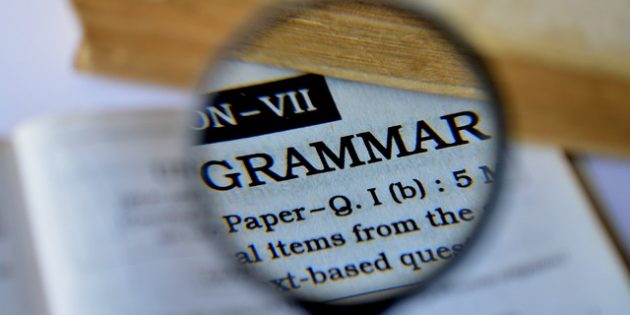
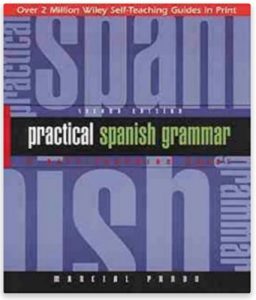
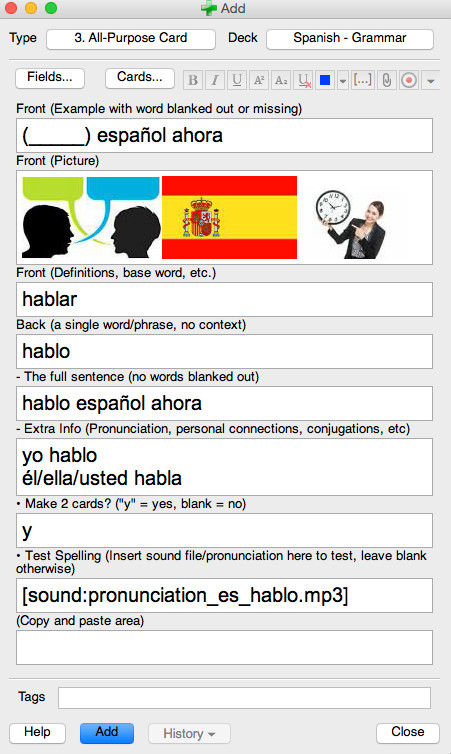
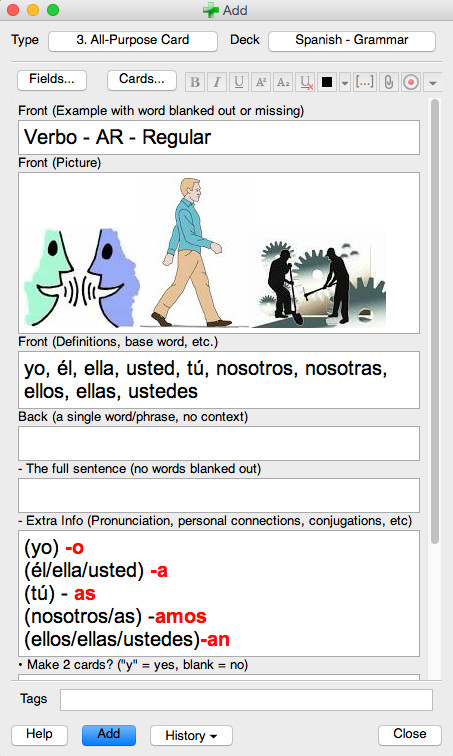
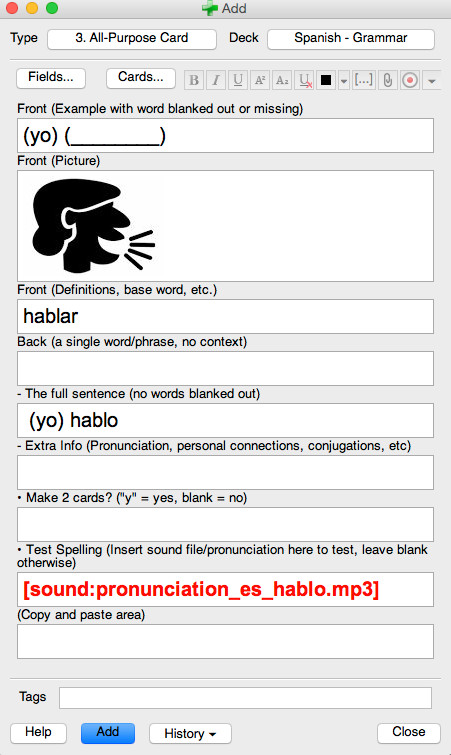






Leave A Response